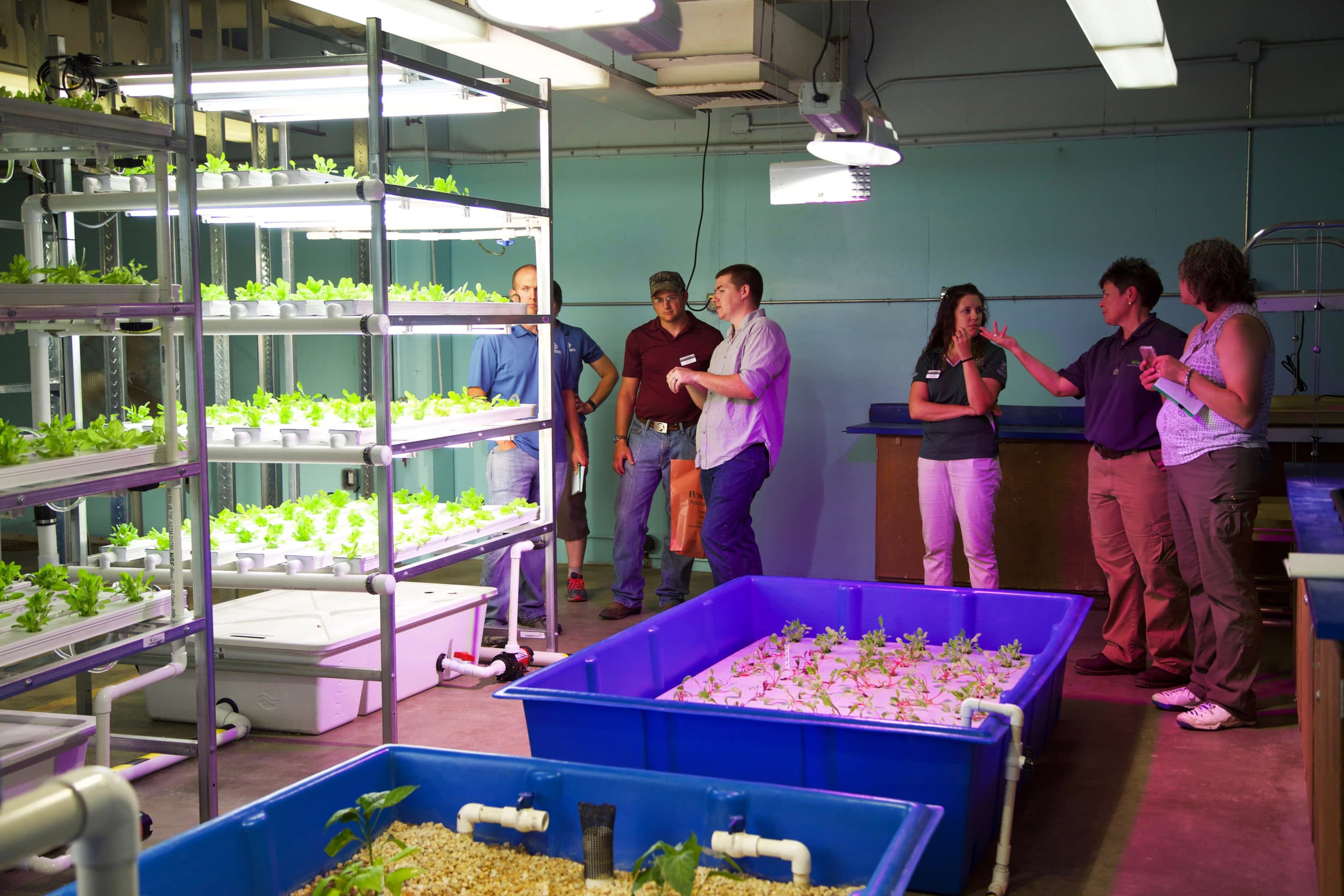INTAG INSTALLS New Aquaponics Technology AT LARGEST AGRICULTURAL SCHOOL IN US

Philadelphia, PA — Students at W.B. Saul High School in Philadelphia will soon learn how fish poop is the foundation to a successful aquaponics system and how to parlay their educational experiences into real world jobs.
Integrated Agriculture Systems (INTAG) has built the first phase of a state-of-the-art aquaponics system in the aquaculture room of the agriculture building at Saul. The 600-square foot system includes a 210 gallon tilapia tank, media bed, float bed, and four-tier vertical set of nutrient film technique (NFT) grow gutters. The looped system reuses its own waste water in a harmonious, sustainable, productive cycle. Fish waste from the tilapia tank accelerates the growth (60% faster than traditional agriculture) of nutrient-dense plants raised without pesticides, while the plant growth cleans the water and returns it to the tilapia tank.
Saul’s system will be one of the largest systems in a public school in the country. Currently, INTAG’s aquaponics system at Steelton-Highspire High School near Harrisburg is the largest system in a public school in the country.
Saul students will learn how to operate the INTAG system as well as explore the related agricultural industry skills in business management, logistics, marketing, high-tech agriculture and more through dual enrollment programs in development at three Pennsylvania colleges and universities.
“Our students are enthusiastic learners and can’t wait to engage with this project,” said Najwa Smith, Natural Sciences and Biotechnology Industry Development Specialist with the School District of Philadelphia. “The range of skills offered transcends just one subject area and offers them knowledge, practical experience, and a spring board to jobs within high-tech agriculture and many other areas.”
“We are advancing responsible food production in a modern era but need the skilled workers to know how and why to use the innovative new systems,” said INTAG Chief Executive Officer Bob Welsh. “The Saul program involves students in the exciting world of agricultural innovation and hopefully inspires them to feed our communities, commonwealth, and the world.”
The timing of this installation not only coincides with both National FFA Week (February 18 – 25) and the School District of Philadelphia’s Career and Technical Education (CTE) Month (February), but also comes at a critical moment in time for the agricultural industry. In announcing the project at Saul, PA Agricultural Secretary Russell Redding, an FFA alumnus and former national officer, noted the urgency in training a new workforce. “Over the next decade, Pennsylvania is anticipating 75,000 job openings in the agriculture and food industry,” Redding explained. “W.B. Saul High School is a living laboratory for agricultural education. We’re here today to showcase some new resources for young people to explore careers that, quite literally, feed the world.”
The INTAG aquaponics system will be fully installed by April. The $150,000 project includes the construction of the hardware, accompanying curriculum, teacher support and training, with funding from state grants and private industry.
INTAG systems combine conventional aquaculture (raising fish and other aquatic life in tanks) and hydroponics (producing plants in water rather than soil) into a symbiotic system that yields superior nutrient content, 60% faster growth with 95% less water use, zero discharge, and without pesticides or synthetic chemicals. INTAG’s hands-on learning, unique curriculum, and award-winning training modules are attractive to educators in workforce development and pre-K through graduate levels.
INTAG provides commercial solutions for food production, wastewater remediation, and STEM/STEAM education. INTAG aquaponics systems are used by commercial food producers, small batch growers, restaurants, farmers, and others, and more than 40 schools in Pennsylvania and Maryland to teach STEM/STEAM education and 21st century workforce development.
W. B. Saul High School of Agricultural Sciences is a magnet school serving more than 500 students on a 130-acre campus in the upper Roxborough section of Philadelphia. The multi-building complex includes an arboretum and athletic fields, golf course, nursery, field crops, pasture area for the livestock, and a working farm which houses poultry, dairy, swine, sheep, horses. Food Moxie (the organization formerly known as Weaver’s Way Community Programs) runs a seasonal farm market (from May through October) on site that has become a food hub for the community.



